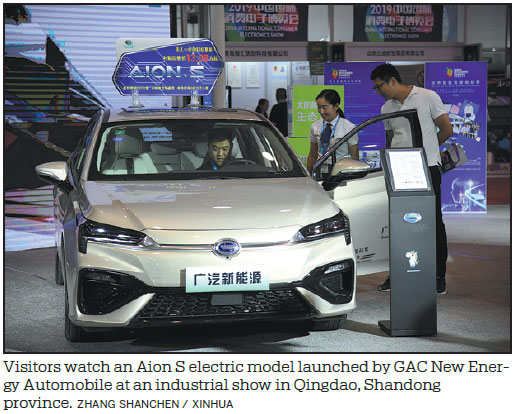Car sales keep falling but hope on horizon with peak months
Industry organization predicts full market recovery may take two to three years
The downward spiral in China's automotive market did not stop in August. Officials at the country's leading industry organization say it may take two to three years for the market to recover.
Overall vehicle sales in the world's biggest vehicle market stood at 1.96 million in August. It represents a fall of 6.9 percent from the same month last year, according to figures released last week by the China Association of Automobile Manufacturers.
Statistics show that August was the 14th month of falls since a dip was noticed in July 2018.
|
A Wey model from Great Wall Motors is displayed at a dealership in Guangzhou, Guangdong province. Provided to China Daily |
Total vehicle sales in the country in the first eight months of 2019 totaled 16.1 million, down 11 percent from the same period last year.
At the start of 2019, the association said the fall may become less severe in coming months. This is because of a lower comparable base figure from the second half of last year and the expected peak months of sales in September and October.
"We expect the market to see some sort of a rebound this year, but we are not sure about how much it will rebound," said Shi Jianhua, a deputy secretary-general of the CAAM.
The association estimated sales this year would be the same as in 2018. But they scaled down the estimate to a 5 percent drop in the middle of the year, to 26.68 million vehicles.
"From what we have seen, it would be a feat if it would be a 5 percent drop," said Shi.

He said favorable measures in past years triggered impulse purchases. This coupled with factors ranging from China's slowing economic growth to Sino-American trade tensions is hurting car sales.
Shi said the market would be more resilient if the authorities had not imposed curbs on car purchases in some cities and released financial stimuli in some years.
Under the current situation, car sales will hover at a low level for two to three years, he predicted.
Carmakers are not optimistic either. BAIC Group, Chinese partner of Hyundai and Mercedes-Benz, estimated the market would fall around 7.5 percent this year from 2018.
"It will be a decent job if China's vehicles sales in 2020 reach the level of this year," said BAIC President Zhang Xiyong at an industry forum held earlier this month in Tianjin.
SAIC Motor, China's largest carmaker, saw its sales in the first eight months of this year stand at 3.86 million. This is down 14.81 percent from the same period last year. Deliveries of all its major sales contributors, from SAIC Volkswagen to SAIC GM, fell in the same period.
Chinese brands are losing their market share. Their combined sales accounted for 38.9 percent of the total from January to August, down from 42.3 percent year-on-year.
Carmakers from Japan and Germany became more popular, but French, US and South Korean carmakers saw a fall in their market share.
The market share of Peugeot, Citroen and Renault combined was a meager 0.7 percent in the first eight months, down from 1.5 percent in the same period last year.
The new energy vehicle segment began losing steam as well. Their sales in August stood at 85,000, a 15.8 percent fall from the same month last year. It came after a 4.7 percent fall in July.
Xu Haidong, another deputy secretary-general of the CAAM, said the fall had a lot to do with the slashed subsidies to car buyers, which are driving up carmakers' costs.

At an industry forum held in early September, Ma Fanglie, president of China's largest electric carmaker BJEV, said: "Everybody in the segment is under pressure as the new subsidy scheme was put in place in June."
The carmaker sold 88,378 in the first eight months, up 26 percent from the same period last year. But it remained a far cry from their goal of 220,000 units. Earlier this year, the CAAM also trimmed its forecast for a rise in new energy vehicle sales to 1.5 million. A forecast of 1.6 million was made at the start of the year.
"But we are confident in the rising trajectory in the new energy vehicle market, which sees higher sales in the second half than in the first one," said Xu.
Premium carmakers have managed to grow despite the headwind in the overall car market.
Mercedes-Benz's August sales grew 12.8 percent to 60,134. This brought its sales in the first eight months to 464,226, up 4.1 percent year-on-year.
Its rival BMW delivered 58,900 vehicles in August, up 10.1 percent from a year earlier. Sales from January to August grew 15.7 percent year-on-year to 462,900 in its largest market.
lifusheng@chinadaily.com.cn

(China Daily 09/16/2019 page18)















